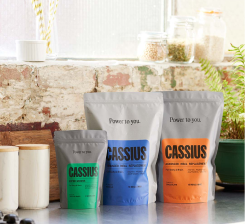

If You’re Not Sleeping, Read This.

We’ve all heard it before, without a solid 7-8 hours of sleep each night things start going down hill... but can you genuinely say you’re getting the recommended 8 hours a night?
Probably not.
Not getting enough sleep is like driving your car on an empty tank, refuelling it with only $5 each time you go to the petrol station, and still expecting it to run like a dream.
You wouldn’t do that to your car, so why would you do it to yourself?
If you aren’t getting 8 hours of sleep each night, you have a higher risk of:
- Memory loss
- Weight gain
- Stroke
- Diabetes
- Heart Attack
- Depression and poor mental health
- High blood pressure
If you want to avoid these, there are some healthy sleeping habits you can start implementing tonight to reduce your risk and improve the hours of sleep you’re getting.
The temperature of your room impacts the temperature of your body. The bodies ideal temperature for sleep sits between 15.6° and 19.4°C. So get yourself a pedestal fan, turn on your air-conditioner and start cooling your environment down at least 1-2 hours before bed to give yourself the best chance.
Light is one of the major regulators of sleep as it tells your brain when it’s day time or night time. So how do you use it to your advantage? Get morning sunlight and avoid blue lights from screens before bed.
Sunlight tells your body clock it is daytime which increases your energy and helps release the hormones needed for sleep at night. Aim for 10-15 minutes in the morning as you wake up.
Blue light on the other hand tricks your brain into thinking it is daytime. That’s fine, except when it’s dark outside as it keeps you awake. Aim to reduce your screen time at least 2 hours before bed.
When you eat, your body starts digesting food which raises your core body temperature and therefore inhibits your sleep. Aim to stop eating at least 3 hours before bed time.
High-intensity exercise is exactly that, high-intensity. It’s a stressor on your body. It raises your heart rate, places you in a state of arousal and increases your body temperature. Which is great for your fitness but terrible for preparing your body to sleep. Sleep requires relaxation, so avoid this at least 2 hours before bed.
It may help you get through your day but caffeine has a 6-10 hour shelf life inside your body. 6-10!!! This means that from your last sip of coffee, it takes 6-10 hours to be effectively processed and eliminated from your body.
Enough sleep will always benefit you more than 3 coffees so aim to have your last coffee at or before 12 noon.
Tell your body when to wake up and when to go to sleep by having the same sleep and wake times each day. Creating an external routine around sleep will also help create an internal one. You will start noticing that your body will naturally become sleepy around your ‘bedtime’ and will wake you up at the same time each morning.
Getting steamy in a hot shower 1-2 hours before bed stimulates blood flow to your extremities allowing heat to escape from your hands and feet.
And if we’ve learnt anything from this chat, it’s that a lower body temperature = better sleep.
You can do all of the previous 7 tips and without a comfortable, relaxing bedroom environment, your sleep will still suffer.
Think quality pillows, black-out curtains, a mattress that leans more to the firm side, a pedestal fan or air conditioner and warm lights. It may seem like a lot but you spend the majority of your life asleep, so it’s important to invest in it.
These are tips you can try right now and many of them are FREE, so why not give it a go tonight and just see the difference over a week?
The main takeaway should be that although you might FEEL like you’re managing on less than 8 hours of sleep — you’re not and it’s time to start prioritising it if we want to reach our health and wellness goals.














